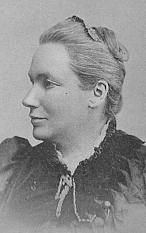
Augusta Jane Chapin (July 16, 1836-June 30, 1905), Universalist minister and educator, was one of the earliest women to be ordained in ministry. She was the first woman to sit on the Council of the General Convention of Universalists. She was also a groundbreaker for women seeking higher education and advanced degrees.
Augusta Jane was born in Lakeville, New York, to Almon Morris and Jane (Pease) Chapin who had moved west from Vermont. She began her formal education at the age of three when her father, proud of her ability to learn, permitted her to attend the local school. A few years later the family settled south of Lansing, Michigan. Augusta grew up there, an avid student in school and pursuing her interests further by reading in her father’s library. At fourteen she taught school in a neighboring county. Two years later, having been unsuccessful in gaining admittance to the all-male University of Michigan, she entered Olivet College, a Congregational school.
At Sunday School Augusta memorized biblical passages for which her teachers provided little or no interpretation. It was not until college that she learned about religious doctrine. She struggled with the idea of eternal punishment, finally coming to the conviction that Bible, nature and reason supported Universalism. By the age of seventeen she knew she would be a preacher. She told a biographer nearly thirty years later: “I have no recollection of ever considering the question of whether I would preach or not. I never deliberately chose the profession of ministry; from the moment I believed in Universalism it was a matter of course that I was to preach it. I never questioned as to how I came by this purpose, nor did it ever seem in the least strange that I should preach, nor had I any real conception of how my course must appear to my friends and the world until I had been more than ten years in the active work.”
Although Chapin’s studies, first at Olivet, then at Michigan Female College, enabled her to receive a classical education, she hoped to attend and graduate from Lombard University or Antioch College. Instead, while preparing for ministry, she served as school principal in Lansing and Lyons, Michigan; then, as head of the Lyons Institute for two more years, she taught Greek, Latin, French, German, higher mathematics, oil painting and drawing.
In 1859 Chapin preached her first sermon at Portland, Michigan. She preached for three years instead of the customary one year before applying for a Letter of Fellowship. This was granted in 1862 by the Michigan Convention of Universalists. On December 7, 1864 In December 1863* she was ordained to the Universalist ministry at Lansing, Michigan. She joined a very small group of American women in ministry which included Lucretia Mott (Quaker), Antoinette Brown (Congregational, later Unitarian), Lydia Jenkins (Universalist) and Olympia Brown (Universalist, ordained earlier that* the previous year).
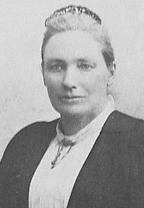
For much of Chapin’s ministerial career she was an itinerant preacher or engaged in short-term settlements: itinerancy in Michigan, 1859-63; Bennington, Michigan, 1864-67; Mount Pleasant, Iowa, 1868; Milwaukee, Wisconsin, 1869; Iowa City, Iowa, 1870-73; Allston, Massachusetts, 1874; San Francisco, California and Oregon, 1874; Pittsburgh, Pennsylvania, 1875-76; Blue Island, Illinois, 1876-77; Chicago, Illinois, 1878; Aurora, Illinois, 1878-79; itinerancy in Michigan, 1880-83; Hillsdale, Michigan, 1884-85; Oak Park, Illinois, 1886-92; Omaha, Nebraska, 1894-95; and Mount Vernon, New York, 1897-1901. She organized new congregations in Grinnell, Iowa and West Liberty, Iowa and helped existing churches to reverse downward trends in growth and development. While in Chicago she shared the pulpit at the merged Unitarian Universalist Christian Union Society of Englewood with the Unitarian Jabez T. Sunderland.
Chapin served as missionary for the Wisconsin Association and as a director of the Iowa Convention of Universalists, 1871-72. She preached the occasional sermons for the Iowa convention, 1871; the Oregon convention, 1874; the Michigan convention, 1883; the Fox River Association convention, 1889; and the General Convention when it met in Washington, D. C. in 1893. She preached the ordination sermon for Florence Ellen Kollock, 1877.
Chapin took a seat on the Council of the General Convention of Universalists as ministerial delegate from Iowa to the Universalist Centennial Celebration in Gloucester, Massachusetts, 1870. Her proposal for non-gender-specific wording in the new rules on fellowship and discipline was adopted. During the Celebration she addressed the meeting of the Woman’s Centenary Aid Association which had been organized the previous year in Buffalo, New York, to assist in raising a portion of the proposed Centenary Fund. In 1873, with Chapin’s help, this group was incorporated as the Woman’s Centenary Association, the first independent national organization of religious women of any denomination.
In 1868 Lombard University (later College) of Galesburg, Illinois, a co-educational Universalist school, granted Chapin an honorary Master of Arts degree. She served Lombard as non-resident lecturer in English literature, 1885-97, and as non-resident lecturer on art, 1892-1897. In 1893 Lombard conferred on her the first Doctor of Divinity degree ever awarded to a woman in America.
Learning and teaching were interspersed with her ministry throughout her lifetime. When the University of Michigan was finally opened to women students, Chapin earned a Master of Arts in rhetoric and contemporary languages, 1884. Later she was for five years an extension lecturer in English literature for the University of Chicago, 1892-97.
Chapin chaired the Woman’s Committee of the World Parliament of Religions which occurred as part of the Chicago World’s Fair Chicago in 1893. In that capacity she addressed the opening and closing sessions, and was the only woman to preside over a session of the Parliament. Among her activities during the Parliament, she read Antoinette Brown Blackwell’s address to the Parliament on the third day, spoke before the Universalist Church Congress, delivered the prayer at the woman ministers’ banquet and assigned her sisters in ministry to the various Chicago area pulpits which had invited women to speak in their churches on the second Sunday of the Parliament. In her welcoming address to the opening session she said, “My memory runs easily back to the time when, in all the modern world, there was not one well equipped college or university open to women students, and when, in all the modern world, no woman had been ordained, or even acknowledged, as a preacher outside the denomination of Friends.”
Chapin was a charter member of the American Woman Suffrage Association and an early member of the New York women’s club, Sorosis. She served on the first executive committee of the Association for the Advancement of Women and gave a paper (later published as “Women in the Ministry”) at its first session in 1873. She was also on the Revising Committee of Elizabeth Cady Stanton’s Woman’s Bible, 1895.
In a sermon of 1901 Chapin preached on “the Church Universal, which is undying, and which belongs to all nations and all times.” According to her Christianity was just one of the many forms of the Church Universal. She thought that in the 20th century churches would have to embrace new methods and new truths: “Let the creeds remain as historic landmarks, but let the church the Master founded move on.”
Death
Although Chapin never married, family ties nonetheless kept her returning annually to the Michigan homestead where she had grown up. In 1905, after 45 active years teaching, preaching, lecturing, writing, working with congregations and women’s groups, she was about to conduct her thirteenth summer literary tour of Europe when she became ill and succumbed to pneumonia. Memorial services were held at the family homestead and burial was in a Michigan graveyard not far away.
Correction
* CORRECTION: Chapin’s date of ordination was changed from 1863 to 1864 on May 30, 2014
Augusta Jane Chapin ordination date correction. In May, 2014, the editors of the Dictionary of Unitarian Universalist Biography (DUUB) changed the year of ordination from 1863 to 1864,in our biography of Augusta Jane Chapin. We base this change on three primary documents. Ed Busch, a member of the First Universalist Church of Lansing, Michigan provided us with the first item, a photocopy of a December 14, 1864 newspaper clipping. The second item supporting this revision is an 1864 diary entry penned by Chauncy W. Knickerbocker (1843-1884), a Universalist minister who delivered the sermon at Chapin’s ordination. The third item is a front page article in the Monday, December 19, 1864 Detroit Free Press. The Detroit Free Press can be accessed at Newspapers.com.
The following publications cite 1863 or December 1863 as the date of ordination for Chapin:
- Our Women Workers (1881)
- A Woman of the Century: Fourteen Hundred-seventy Biographical Sketches … (1893)
- Notable American Women: Volume 2 (1971)
- Unitarian and Universalist Women Ministers (1975 & 1985)
- Schlesinger Library – Augusta Jane Chapin papers (1996-97 acquisition)
- Standing Before Us (2000)
- Dictionary of Unitarian & Universalist Biography (2002)
Getting this date right is of interest because Augusta Jane Chapin was among the first women ordained to the Universalist ministry. It is claimed that Olympia Brown, ordained in 1863, was the first woman to achieve full ministerial standing recognized by a denomination. There is also some evidence that Lydia Ann Jenkins was the first woman to be ordained with full denominational authority. An in depth exploration of early women in the ministry can be found in Barbara Coeyman’s article, “Celebrating the Ordination of
Olympia Brown: Context and Implications,” in the Journal of Unitarian Universalist History, Volume XXXVII (2013-2014).
The Newspaper Clippings
A copy of an 1864 newspaper article from the Lansing State Republican found in a scrapbook kept by the First Universalist Church of Lansing, Michigan provides an 1864 date for the Chapin ordination. The scrapbook resides in the archives at Michigan State University in East Lansing, Michigan. The First Universalist Church of Lansing and the UU Fellowship of East Lansing merged in 1957 to form the Unitarian Universalist Church of Greater Lansing (UUCGL). Ed Busch, a UUCGL member, cross-checked the clipping with archive microfilm copies of the newspaper to insure the authenticity of the clippings.
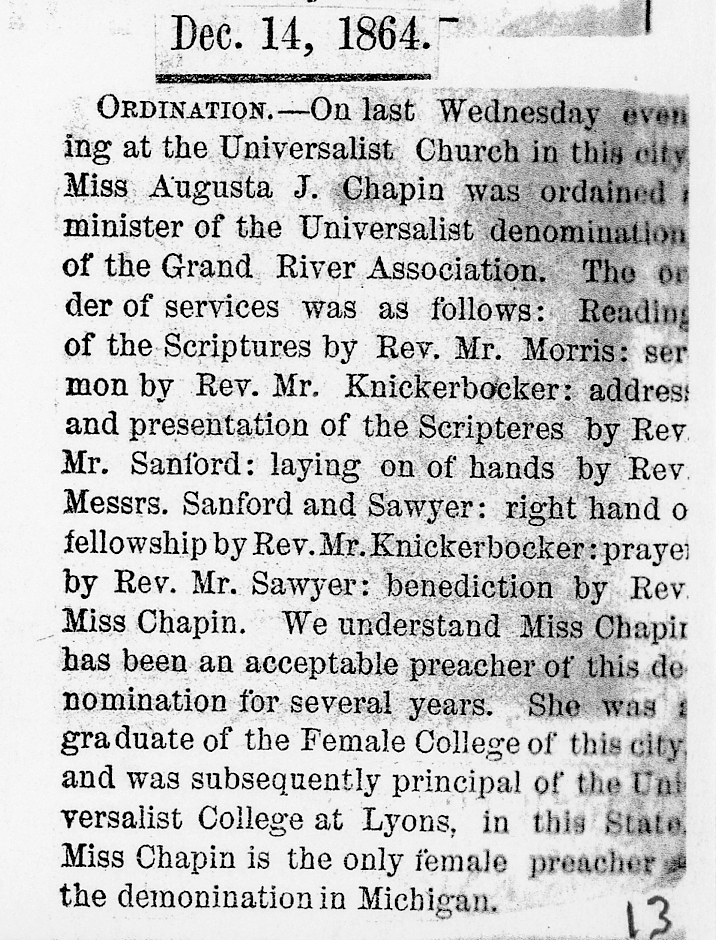
Another version of the same newspaper article was found in February 2016 using the archives at Newspapers.com.
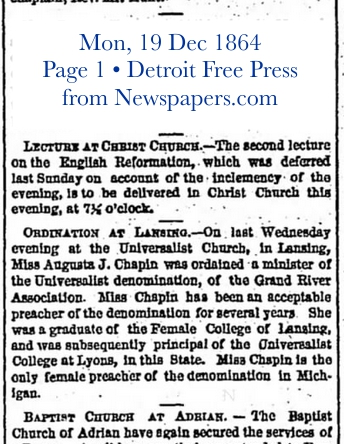
C. W. Knickerbacker Diary Entry
Chauncy Washington Knickerbacker (1843-1884) was a Universalist minister in Michigan. Ordained in 1850, Knickerbacker was minister in Lansing, 1853-60; an officer in the Michigan Universalist Convention, 1855-1880; and a circuit riding preacher to congregations in Farmington, Wayne, Rochester, and New Hudson, Michigan.
In 2007, Gwen Foss published a collection of transcriptions: Diaries of the Reverend Chauncy Washington Knickerbacker, Universalist Minister: 1843-1884. The originals are in the Bentley Historical Library at the University of Michigan. Here is a copy of page 50 of the transcribed diary entries for December 4-10, 1864:
Italics indicate the author’s (Gwen Foss) interpretation and exposition.
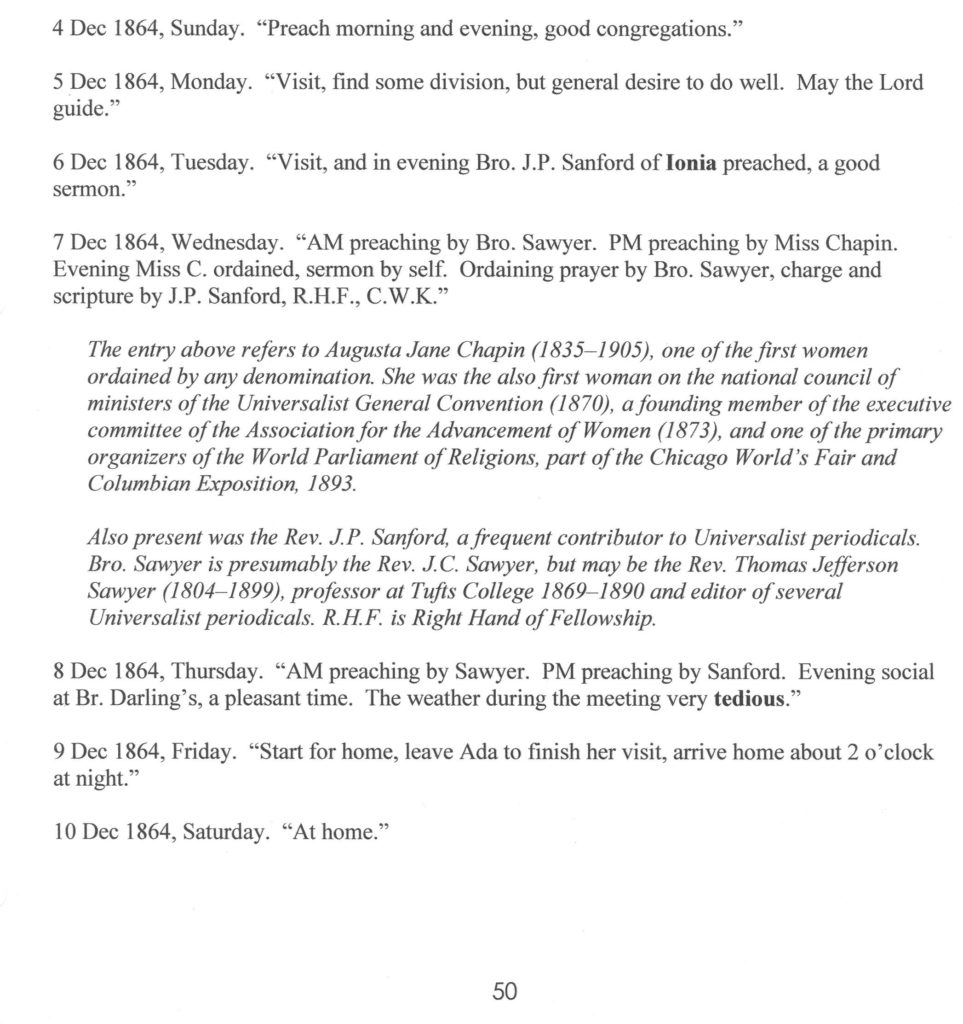
Knickerbacker’s diary, like the Lansing Newspaper clipping, supports the 1864 date. One could doubt the Knickerbacker diary entry for a number of reasons; it is a transcription from handwritten diary and the transcriber could have errored, the entry on the original diary page was entered or altered at a later date, or maybe the diarist kept poor records. On the other hand; daily entries by Knickerbacker that all have the wrong year are highly unlikely. As a circuit rider who traveled by trains—often two or three a day— it is likely that Knickerbacker had a keen sense of time and date. The 230 page transcription of the Knickerbacker Diaries are available from Gwen Foss at gwenfoss.com
Universalist Register and Almanac for 1871
There is one document that gives the Chapin ordination date as 1862. The Universalist Register and Almanac for 1871 says on Page 72, in the “alphabetical list of clergymen, with their post-office address, and date of ordination as far as ascertained:” that Chapin was ordained in 1862. The copy of this Register and Almanac at the HathiTrust library says it was “gifted on Jan 7, 1871 to the library” according to handwritten note on the title page. That would suggest that the “Universalist Register and Almanac for 1871” was probably composed and printed in 1870.
Ministerial, national, state, and local congregation information in The Universalist Register depended on voluntary submissions from state association officers and others. The 1862 ordination date for Chapin was not repeated so it’s likely a reporting error. A. B. Grosh, the Register editor encouraged corrections and early submission of statistics.
Conclusions
The Lansing newspaper article and the diary entry by Knickerbacker both point to an 1864 ordination for Chapin. Both items were recorded within days of the original event. In addition, Knickerbacker took part in the ordination and his list of participants is consistent with the newspaper account. The 1862 date in the Universalist Register and Almanac for 1871, on the other hand, has no collaborating items and no supporting details.
The first mention of the 1863 ordination date found is in Our Women Workers: Biographical sketches of women eminent in the Universalist church for literary, philanthropic and Christian work by E. R. Hanson (1881). This biographical sketch appears to be based on correspondence with Chapin and others that took place more than 15 years after the ordination. It seems likely that this became the source of the 1863 date for subsequent books and articles.
Based on the 1864 newspaper article and reverend Knickerbacker’s 1864 diary entry we are changing the ordination date for Augusta Jane Chapin in the Dictionary of Unitarian and Universalist Biography (DUUB) to Wednesday, December 7, 1864 not Thursday, December 3, 1863.
Jim Nugent, managing editor
Dictionary of Unitarian and Universalist Biography
Sources
There are letters of Augusta Chapin in the Schlesinger Library, Radcliffe College in Cambridge, Massachusetts and in the archives of Meadville/Lombard Theological School in Chicago, Illinois. Chapin’s sermons and other writings are published in various periodicals including The Universalist Leader, The Repository: A Magazine for the Christian Home, The Star in the West, New Covenant, and Woman’s Journal. Some of her speeches are in Speeches at the World Parliament of Religion (1893) and Proceedings of the Universalist Centennial Held in Gloucester, Mass., September 20th, 21st, and 22nd, 1870 (1870).
Among short biographies of Chapin are Phlox Laucher, “For a woman to speak in church”: The Proud Calling of Augusta Jane Chapin, Unitarian Universalist Women’s Heritage Society Occasional Paper #17 (1997) and the entries in Eliza Rice Hanson, Our Woman Workers (1881); Frances Elizabeth Willard, ed., American Women, 1500 Biographies (1897); Catherine F. Hitchings, Universalist and Unitarian Women Ministers (Journal of the Universalist Historical Society, 1975); and Dorothy May Emerson, ed., Standing Before Us (2000). Chapin’s obituary is in The Universalist Leader (July 15, 1905). See also James Swanson, A History of Lombard College: 1851-1930 (1955); Frank M. Turner, Historic Michigan: An account of Ingham County from its organization, Volume 3 (1924); Mrs. Franc L. Adams, History of Ingham County (1923); John Henry Barrows, The World’s Parliament of Religions (1893); and Minot J. Savage, The World’s Congress of Religions (1893).
Article by Beverly Bumbaugh
Posted June 12, 2002, Correction of ordination date May 2014